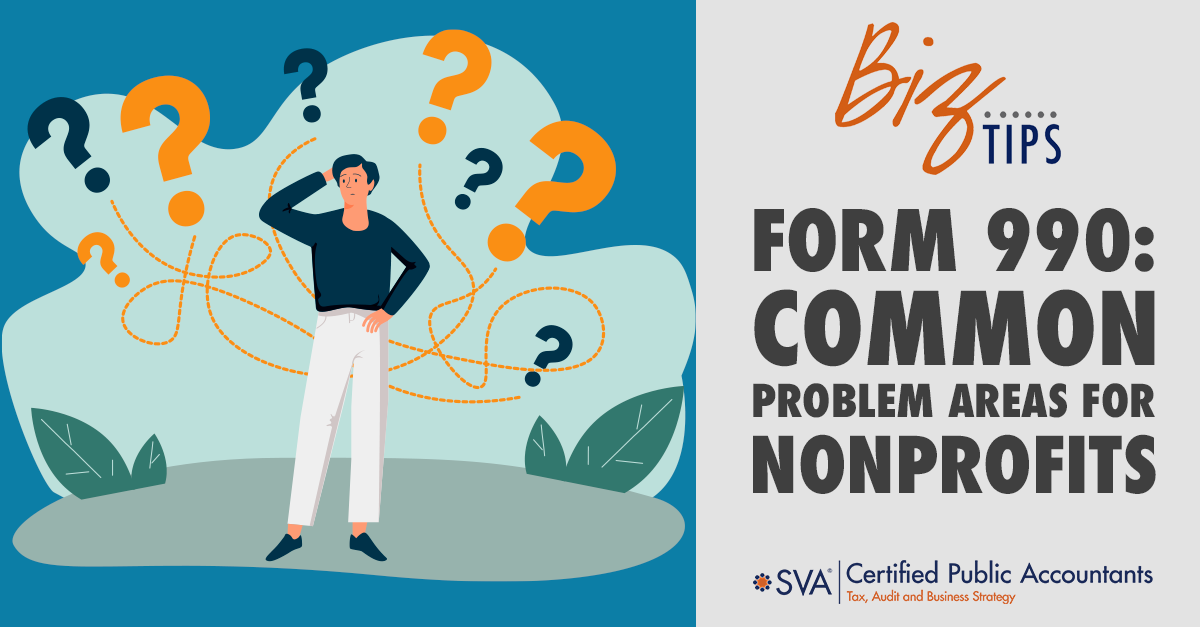| Highlights: |
- Summarizes key challenges nonprofits face in preparing IRS Form 990, including understanding form versions and fiscal-year applicability.
- Identifies frequent reporting issues with compensation figures and differences between Part VII and Part X data.
- Explains confusion around which schedules to attach and how required attachments vary by organization type.
- Emphasizes the complexity of compliance and encourages accurate preparation or professional assistance to avoid errors.
|
In a review of 2021, SVA’s nonprofit experts stated that many of the questions and issues they received from clients were related to the confusion around Form 990.
The combination of a long form (12 pages), the possibility of up to 16 attachments (schedules), and different reporting requirements can be a lot for an organization to handle.
Here is a brief background of Form 990 and 3 common problem areas experienced by nonprofit organizations.
Purpose of Form 990: Return of Organization Exempt From Income Tax
Form 990 provides the IRS and the public information about your organization. This information includes:
- Programs and Activities
- Transactions
- Governance
- Relationships
- Revenue, Expenses, and Assets
This information is also used by the IRS to make sure exempt organizations are abiding by tax laws.
Which Form 990 Does My Organization Need to File?
There are thresholds that help organizations determine which Form 990 to file:
| 990 |
Gross receipts greater than or equal to $200,000 OR total assets greater than or equal to $500,000 |
| 990-EZ |
Gross receipts less than $200,000 AND total assets less than $500,000 |
| 990-N |
Gross receipts normally less than or equal to $50,000 |
| 990-PF |
Private Foundation – regardless of financial status |
What Form Year Do I Use?
Since we are in 2022, you might think you would use the 2022 version when filing at your year-end, but that may not be the case. Which version you use depends on your organization’s current fiscal year start date.
For instance, if your fiscal year ends on 9/30/22, you will still use the 2021 version of the form. Only organizations with year-ends on 12/31/2022 will use the 2022 form in 2022.
Schedules
There are currently 16 schedules for Form 990 (A through R). Some schedules are only used with certain 990 forms and some only apply to certain types of organizations, such as hospitals and schools. Schedules applicable to your organization are completed and then attached to Form 990 at the time of filing.
For a complete list of Form 990 schedules, click the link below:
Form 990 Schedules
Filing Due Dates
Organizations have until the 15th day of the 5th month following their fiscal year-end to file. For example, if your organization’s fiscal year ends on June 30th, you will have until November 15th to file. If your organization requires additional time to file, a six-month extension may be granted by filling out Form 8868 before the due date.
Common Problem Areas
In a recent Biz Tip, SVA’s nonprofit industry experts discussed how Form 990 was the cause of many problems and questions from their clients.
The form consists of 12 pages, with the possibility of multiple schedules needing to be attached, and the required information for each schedule makes it easy to see why this form has nonprofit organizations seeking professional assistance.
Here are 3 common trouble areas our experts heard from clients:
1. Correct Year and Form
Determining which form to use (2021 or 2022) was an issue, as well as which version to file (990, -EZ, -N, -PF).
| Solution |
| Use your organization’s current fiscal year start date to determine which form year to use. For the version, make sure to calculate your organization’s gross receipts and total assets. Use these figures and the thresholds listed above to determine which version to use. |
2. Reporting Compensation
Another point of confusion among clients is the need to report compensation in two different sections of Form 990.
| Part VII (Compensation of Officers, Directors, Trustees, Key Employees, Highest Compensated Employees, and Independent Contractors) |
| In this section, organizations are required to report compensation as of 12/31, even if 6/30 is year-end for an organization. |
| Part X (Statement of Functional Expenses) |
| This section requires expenses, including compensation, to be reported as of the organization’s fiscal year. |
If an organization has a 6/30 year-end, the compensation amounts will not agree between the two parts, which confuses organizations.
| Solution |
| There are really only two solutions to this issue. One, take the time and accurately calculate the correct compensation figures to report in Part VII and Part X. If you do not have personnel to ensure accurate reporting, your best option is to look to your accountants or a nonprofit consulting firm to help you. |
3. Various Schedules
The Form 990 itself is 12 pages, but there are multiple schedules that may need to be attached based on responses in Part IV (Checklist of Required Schedules). Schedules can range from Schedule A to Schedule R. These schedules and what is required in them also can cause issues.
| Solution |
| As with reporting compensation, one solution is to determine which schedules you may need to file. Once you determine which Form 990 is appropriate for your organization, look to see which schedules are used with that form. Look at each of these schedules and see if they apply to your organization. If so, make sure to complete these schedules and attach them to your Form 990 when filing. |
Reporting Requirements
An important note to remember is that nonprofit organizations are required to file a Form 990 annually. There are organizations that are exempt from annual filing:
- Organizations that have gross receipts and assets below certain thresholds may file a Form 990-EZ.
- Government and church-related organizations are not required to file annual returns.
- Organizations that normally have annual gross receipts of less than $50,00 are also not required to file annually.
Finally, organizations that meet the requirements are required to file a Form 990 annually. An organization that does not file may receive penalties from the IRS, and if a return is not filed for 3 consecutive years, an organization will automatically lose their tax-exempt status.
If you feel you don’t have time to file by the due date, make sure to file a Form 8868 for a six-month extension.
Assistance is Available
Your organization is focused on day-to-day operations and it can sometimes be difficult to pay attention to tax-related issues. If you find you are struggling with completing Form 990 and the related schedules, reach out to professionals who can help.
© 2022 SVA Certified Public Accountants

